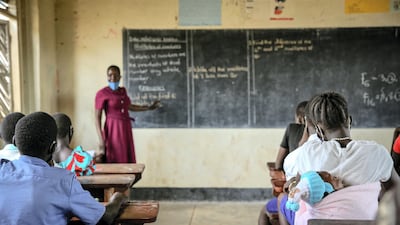The UK government's foreign aid cuts will undermine its leadership of the G7 and could have a devastating effect on global education, international child rights organisation Save the Children said.
Women's education is one of the agenda items at next week's G7 summit in London after the UK launched the Girls' Education Declaration last month, with a target to get 40 million more of the world's girls into school.
However, without financial commitments in place, humanitarians say the declaration may be an empty promise, particularly given recent revelations that the UK has cut 40 per cent of its aid budget for girls' education.
"This is really damaging and actually undermines their global leadership at this time, because they're saying they want to really step up on girls' education and drive this globally. But at the same time they're also cutting their budgets to girls' education [and] they're also cutting their budget for family planning, and nutrition ... and removing critical services that children need to get them to be prosperous, to have healthy lives to learn, and be happy," Emma Wagner, a senior education policy adviser at Save the Children, told The National.
The UK government announced last year it would cut UK aid spending from 0.7 per cent of national income to 0.5 per cent – a reduction of more than £4 billion ($5.67bn). While the details on which programmes and countries will be affected are vague, Foreign Secretary Dominic Raab suggested last month that UK aid to Africa would be reduced to a third of what it was two years ago, and budgets for humanitarian assistance in war-torn countries such as Yemen and Syria faced cuts of up to 60 per cent.
The UK's G7 presidency will be followed by a landmark global education summit jointly hosted with Kenya in July. Similarly focused on girls' education, this year's Global Partnership for Education has set a $5 billion funding target to reach 175 million children over the next five years.
Welcoming the summit as an important step in the post-Covid recovery of education systems, Save the Children is asking the UK government to invest £600 million into the fund and to encourage others by announcing its pledge early. There are concerns, however, that the UK government’s ongoing aid budget cuts are undermining the education ambitions of this year’s G7 host.
"We call on the UK government to reverse the cuts they're making across the board, and to continue to be global leaders on education, but also to keep their promises to the poorest children all around the world and keep their manifesto commitments, which they were elected on," Ms Wagner said.
While largely invisible, the cost of losing out on education is seismic and wide-reaching. As governments around the world look to repair the economic damage brought on by the pandemic, experts are warning that some things, like the potential loss of a generation of children, will be much harder to retrieve.
International agencies have been sounding the alarm since the early days of the pandemic after the UN children's fund Unicef revealed that 91 per cent of learners worldwide – nearly 1.6 billion children – were pushed out of school during the peak of the first wave.
Save the Children said there are still more than 600 million children out of school as national closures remain in nearly 60 countries around the world. Their recent analysis also showed that on average every child missed more than a third of a school year owing to school closures and lack of access to remote learning.
Unsurprisingly, the world's poorest children were disproportionately affected, with children in Latin America, the Caribbean and South Asia missing out on almost triple the education of children in Western Europe. In the Middle East, children lost an average of 80 school days each. In Lebanon, where the pandemic precipitated a severe economic and political crisis, 1.2 million children's education was adversely affected by Covid-19.
"Parents told us that because of increased household income pressures, they're having to make really difficult decisions around whether they send their children to school, or put food on a table, just because food prices have really increased," Ms Wagner said.
According to UNHCR, the UN refugee agency, there are about seven million school-aged refugees around the world and approximately half were out of school before the onset of the global crisis. The worry, Ms Wagner said, is that this number will increase.
“We know that millions of children now are actually pushed further into poverty because of the economic impact of the pandemic. So we are seeing that children are not returning to school when they can do because of increased household poverty and increases in child marriage and child labour,” the education adviser said.
The charity launched its 100 Days of Action initiative on International Children's Day, June 1, in an attempt to get campaigners to demand leaders worldwide prioritise education. The charity said that between 10 million and 16 million children may never return to school and it wants governments worldwide to put education at the top of the post-Covid agenda.
According to Save the Children research, it will cost an average of $370 per child to get learning safely back on track in 59 of the world’s poorest countries and is calling for a global investment of $50bn to fund an emergency education action plan.
The charity also noted that global vaccine equity plays an important part in the speed and effectiveness of education recovery plans.


